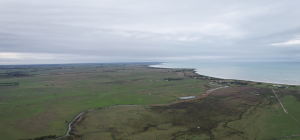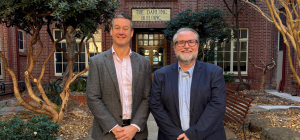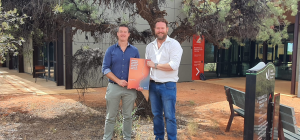
Healthy wetland animal populations depend on having both suitable habitat and a functioning food web. The Coorong consists of a diverse range of aquatic and terrestrial habitats, which support a multitude of animal and plant species. Yet, changes in environmental conditions such as reduced freshwater inflows, high salinity and nutrient loads, have impacted upon habitat quality and food resources for animals that call the Coorong home. There is limited understanding of what food sources key species fundamentally rely on in the Coorong, how energy passes through the Coorong food web from the microscopic algae in the water (primary producers) up to the top predators (such as fish and waterbirds), and how this is impacted by changes in environmental conditions. This lack of knowledge limits the ability of managers to predict how the Coorong ecosystem may respond to different management scenarios.
This article is the latest in a series of In Focus articles published in the Goyder Institute eNews on the Goyder Institute-led research being delivered as part of the $77.8 million Healthy Coorong, Healthy Basin (HCHB) Program. This initiative of the Australian and South Australian governments aims to support the long-term health of the Coorong by providing evidence-based solutions to both immediate threats and future conditions under a changing climate. The Goyder Institute for Water Research is the delivery partner for five research components of HCHB, providing independent research to inform future management decisions for the region.
In this issue, we explore the research on the Coorong Food Web Component led by Dr Qifeng Ye from the South Australian Research and Development Institute (SARDI) in partnership with teams at Flinders University and The University of Adelaide.
The research is aiming to improve the knowledge of the Coorong food web, and in particular to develop quantitative models to assess how the food web has responded to decades of environmental change. Using data from other hydrological and biogeochemical models in combination with data collected through the HCHB Program, these food web models will provide a key tool to evaluate the extent to which different management scenarios are likely to improve the availability and quality of food resources and the viability of fish and waterbird populations in the Coorong.
“A functional and resilient food web is critical to the ecological character of the Coorong” said Dr Ye. “Understanding how the food web has previously responded to changes in environmental conditions such as salinity, freshwater flows and nutrient availability and how it may respond to different conditions and management actions in the future is critically important to maintain and restore diverse habitats and abundant animal populations” she said.
“To understand the complex linkages within the Coorong food web, we are identifying the key food sources for the waterbirds and fish at the top of the food web and looking at the availability and quality of the food resources in the Coorong in terms of, for example, energy content” said Dr Ye. “We are finding that, the bugs in the sediment, called macroinvertebrates, as well as small-bodied fish, are the key prey items for predators. For example, we have used DNA analysis techniques to examine bird droppings to identify what prey items have been eaten by specific waterbirds. We have also examined the contents of fish stomachs and identified that amphipods (a small crustacean) are a key food source for the lagoon goby, a small prey fish in the Coorong, filling a key knowledge gap for this species. Furthermore, we are undertaking investigations to understand habitat requirements and environmental conditions needed to sustain populations of these prey items, and using a modelling approach to identify different linkages within the food web and explore how these may change under different environmental conditions” she said.

A novel aspect of this research for the Coorong is to investigate the energy content of the key prey items.
“Examining the energy of key food resources has never been undertaken before in the Coorong” said Dr Ye. “Yet, this is critical for understanding the interactions of the Coorong food web and beyond. For some species, such as the migratory shorebirds which inhabit the Coorong over summer but then fly to the northern hemisphere over winter, storing enough energy in their body over the summer months is vital to complete their migration. If the environmental conditions in the Coorong mean that birds are unable to feed and gain enough energy due to reduced availability or quality of prey, then it will be difficult for those birds to successfully migrate and return to the Coorong the following year” she said.
The Food Web Component has strong links with the Nutrient Dynamics, Aquatic Plants and Algae and Waterbirds Components of the Goyder-led HCHB Trials and Investigations Project. This ensures the data collected across all of these Components are incorporated to develop the integrated food web model, which is key for predicting food web response under future management scenarios.
“Although some qualitative, conceptual food web models for the Coorong have been developed previously, this is the first time that a quantitative food web model is being developed for the region” Dr Ye said. “This is very exciting, as for the first time we will be able to examine how different aspects of the Coorong food web may respond to changing environmental conditions and management decisions, based on contemporary data and knowledge rather than just on expert opinion. This will make decision making much more robust as it will be based on stronger scientific evidence” she said.
Over coming months, the Food Webs team will finalise the food web model based on the understanding of the diet composition of key fish and waterbirds, and existing and newly collected data on habitat quality and environmental conditions, species abundance and distribution, and the bioenergetic content of food resources in the Coorong.
More information on the HCHB Food Webs Component can be found here. For further information on the Goyder Institute-led HCHB research, please contact Dr Alec Rolston.

This project is part of the South Australian Government’s Healthy Coorong, Healthy Basin Program, which is jointly funded by the Australian and South Australian governments.


